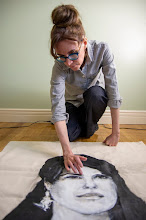Monday, December 29, 2014
Paris Letters by Janice MacLeod
“…likely to appeal to fans of Elizabeth Gilbert’s EAT PRAY LOVE...”
After unwrapping Christmas gifts, I took a rare break from lecture preparations to kick back with one of my presents, Paris Letters (2014, Sourcebooks Inc.) by Janice MacLeod, in which the author gives up a job in Los Angeles as a copywriter to find the meaning of life in Europe during her mid-thirties. When someone who hails from the same rural county as you writes a bestseller, the overwhelming impulse is to want to like the book. At best, I can borrow MacLeod’s wording of “cute, but slow”—which she used to imagine the Parisians’ assessment of her Anglophone self because of the language barrier—as a description of her autobiography.
MacLeod relays the details of her job of writing text for junk mail, presumably so that the onerous task will ultimately stand in contrast to the pleasurable creation of painted letters for subscribers. The degree of detail draws out this portion, though. This is followed by an entire chapter about the epiphany she has while cleaning her underwear drawer in which she quotes four times the voice in her head that says, “Clean out your underwear drawer.” In the process, she says farewell to the lovers for whom the undergarments were purchased. From there, she moves on to her clothes closet, which keeps her away from the mall, contributing to her ability to skip town. At the end of the book, there is a list of 100 things that she did to save money. As comedian George Carlin said of the Ten Commandments, many could be combined rather than being stretched out into a significant-sounding number, like playing the stock market and--listed separately--taking the advice of rich men at the coffee shop about how to play the stock market.
MacLeod captures the local colour of Paris, from its delectable macarons to the hair salon in Robespierre’s former bedroom, where she has her bridal hair done. Throughout the book, “see[ing] Paris as a canvas,” she includes her illustrated letters, but unfortunately not in colour. In the negative space of a rosebush, or a less visually busy area like a winding sidewalk, she writes about her experiences and the city’s history. The complication is that she appropriated the concept from another artist, Percy Kelly (1918-1993) (1). In a passage where I almost gave up reading Paris Letters altogether, she reveals, “…I sat in a chair with Percy’s book. At moments, I felt Percy whispering to me from the pages” (p. 88). Fortunately she attributes her source, but she seems to have no qualms about using someone else’s concept, which is consistent with her lack of conviction in the canvases she makes of crows to sell on Etsy to help fund her trip. It wasn’t until she referred to the Mona Lisa as “my new friend Mona” (p. 79) that I lowered my expectations. Since I sound like the Grinch, I will concede that MacLeod can’t be faulted for lack of passion about being an artist. She makes a New Year’s resolution to become an artist; reads Julia Cameron’s The Artist’s Way (1992, Penguin Group) and introduces Paris Letters with a quotation from it; and announces two-thirds of the way through, “It had only occurred to me in that moment that I was indeed an artist. In Paris!” (p. 175).
The author finds love in Paris, with a butcher named Christophe. She describes him as lovely and evidently he is: Christophe buys matching robes so they can always feel like they’re on vacation, and when she sulks, he calls her phone and sings Lionel Ritchie’s I Just Called to Say I Love You. Their relationship feels one-dimensional, because it moves forward seamlessly, aside from no common language and eventual bureaucratic obstacles related to MacLeod’s visa, both of which are described humorously. They declare their love after two weeks and when she's travelling afterwards, he calls several times a day. To use a postal analogy for their relationship, since that seems apropos for a book about letters sent by mail, Jacques Derrida’s concept of adestination (the “possibility of non-arrival”) (2) is absent. The happy ending is a fait accompli. There is a PG-rated sightseeing day in Rome with a man with whom she once flirted, which demonstrates her loyalty to Christophe but also her slight hesitation about settling down. Unsurprisingly, she trades in her take-out boxes for eating on plates with Christophe. She writes, “Everything was perfect.” Melodramatically, she begins the next paragraph with, “Until I changed things.” She then recalls how she updated the apartment flooring after he recommended against it; it causes the couple to walk in silence and then they make up immediately afterwards. It feels like tokenism to hint at tension but avoid causing irreparable damage to their relationship by disclosing something more substantial. If there are no skeletons in the closet, good for them...but give it time, eh?
Paris Letters is likely to appeal to fans of Elizabeth Gilbert’s EAT PRAY LOVE (2006, Viking), as the protagonist gives up the majority of her possessions, lands in Europe with an insatiable appetite, ponders spirituality (though to a lesser degree here), and finds love. This comparison is invited by a photograph of the two authors on MacLeod’s website. Relatedly, fans of Julia Roberts may appreciate Macleod’s Runaway Bride-like realization that she changed herself to be like her various boyfriends, taking on their hobbies to be relatable and agreeable. Those who dislike the rom-com and chick lit genres may prefer to clean out their underwear drawers instead.
(1) Percy Kelly changed his name to Roberta Kelly in 1985 but eschewed a sex change operation. (2) Tucker, Thomas D. Derridada: Duchamp As Readymade Deconstruction. Lanham, MD: Lexington Books, 2009. Print. Image: reproduced in 2019 via fair use/dealing. Source: https://shop.sourcebooks.com/paris-letters.html
Subscribe to:
Comments (Atom)

